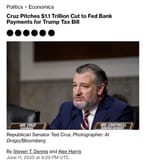Search Results
ID: Olcmz8kr/biz/60493015#60495382
6/12/2025, 5:19:36 PM
> https://archive.is/Wr4aF
> Texas Senator Ted Cruz pitched Republican senators Wednesday on ending the Federal Reserve’s authority to pay interest to banks, claiming it would save $1.1 trillion over a decade, with members of the party’s conservative flank lauding the idea.
>“I made the case directly to the president in the Oval Office last week, I made the case at lunch today,” Cruz said in an interview at the Capitol. If the idea is added to Trump’s massive tax and spending package, it could help to offset the cost and limit its impact on the deficit, Cruz said.
>Cruz noted payments of interest on reserves only started in 2008 during the financial crisis, but have exploded from $1 billion that year to $186 billion in 2024 as interest rates climbed.
“The case I made at lunch is we’re agonizing trying to find a $50 billion cut here and there. This is over a trillion dollars, big dollars in savings,” he said. “Half of it is going to foreign banks, which makes no sense.”
IORB sets a floor for short-term interest rates because banks have no incentive to lend below what they can earn risk-free by parking cash at the Fed.
If IORB is abolished:
Banks holding reserves (which are now essentially just all deposits, since reserve requirements are 0%) are forced to find yield elsewhere or absorb operating losses.
This floods money markets, crushing yields — possibly into negative nominal territory.
Downstream effects:
Everything becomes more attractive to borrow against.
Real assets become inflation hedges.
Spending accelerates as holding cash becomes a cost.
If no control mechanism is installed, this turns into a hyperinflationary spiral.
The only possible "break" on this runaway dynamic would be:
Reimposing high reserve requirements, which would create a sudden liquidity vacuum — a deflationary crash.
Ted Cruz is threatening to push the big red button. This is wild.
> Texas Senator Ted Cruz pitched Republican senators Wednesday on ending the Federal Reserve’s authority to pay interest to banks, claiming it would save $1.1 trillion over a decade, with members of the party’s conservative flank lauding the idea.
>“I made the case directly to the president in the Oval Office last week, I made the case at lunch today,” Cruz said in an interview at the Capitol. If the idea is added to Trump’s massive tax and spending package, it could help to offset the cost and limit its impact on the deficit, Cruz said.
>Cruz noted payments of interest on reserves only started in 2008 during the financial crisis, but have exploded from $1 billion that year to $186 billion in 2024 as interest rates climbed.
“The case I made at lunch is we’re agonizing trying to find a $50 billion cut here and there. This is over a trillion dollars, big dollars in savings,” he said. “Half of it is going to foreign banks, which makes no sense.”
IORB sets a floor for short-term interest rates because banks have no incentive to lend below what they can earn risk-free by parking cash at the Fed.
If IORB is abolished:
Banks holding reserves (which are now essentially just all deposits, since reserve requirements are 0%) are forced to find yield elsewhere or absorb operating losses.
This floods money markets, crushing yields — possibly into negative nominal territory.
Downstream effects:
Everything becomes more attractive to borrow against.
Real assets become inflation hedges.
Spending accelerates as holding cash becomes a cost.
If no control mechanism is installed, this turns into a hyperinflationary spiral.
The only possible "break" on this runaway dynamic would be:
Reimposing high reserve requirements, which would create a sudden liquidity vacuum — a deflationary crash.
Ted Cruz is threatening to push the big red button. This is wild.
Page 1
